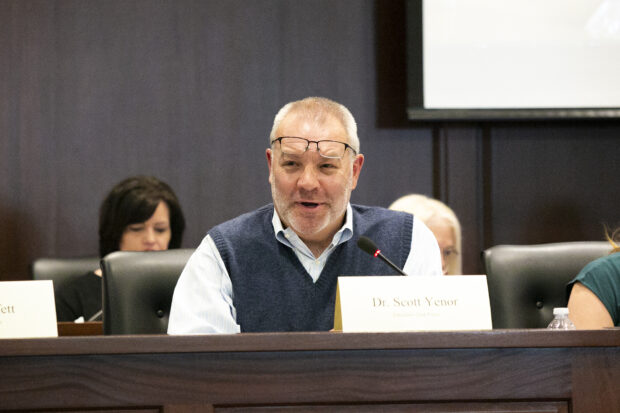Believe it or not, Scott Yenor actually said something recently that flew under the radar.
About higher education.
During his now-viral speech from the National Conservatism Conference on Oct. 31, the Boise State University political science professor said this, and it received relatively little attention: “We need to de-emphasize our colleges and universities. That’s essential to making progress on family matters.”

Yenor called the campuses — including, presumably, the one at which he works — “the citadels of our gynecocracy.”
It’s quite remarkable, really. A tenured professor at a state-run university — in a state with chronically low college attendance rates — basically said too many college students are wasting their time and losing their way.
You know those slick promotional PSAs universities get to air when their football team plays on TV? Don’t expect Boise State to splice in this soundbite from the Yenor video: “Almost everything in these indoctrination camps complicates the male-female dance. It delays growing up.”
And this is part of Boise State’s Scott Yenor problem.
Yenor’s criticism of higher education as an institution — and his challenge of the notion of higher education as a public good — will resonate with Boise State’s political adversaries. With legislators who cut the university’s budget this year, and will take a run at cutting next year’s budget.
First things first, of course.
Boise State has a front-burner public relations conflagration on its hands because of Yenor’s attacks on feminism — including, but not limited to, his observations about the “medicated, meddlesome and quarrelsome” career-oriented woman. Inevitably, and fittingly, these comments sparked their intended firestorm.
And it’s fallen to Yenor’s departmental colleagues and Boise State’s student government to deliver the strongest response from campus.
“We – like many of you — found the video painful to watch,” Boise State’s political science faculty said in an email to students majoring and minoring in the program. “We recognize (Yenor’s) statements are not only inaccurate but also offensive and hurtful — these are not the viewpoints and values the rest of the political science faculty hold.”
Said the Associated Students of Boise State University, in a resolution last week: “We as ASBSU reject the notion that academic freedom permits discriminatory, oppressive, and outright harmful conduct to students, faculty, and staff of Boise State University.”
By comparison, the official statement from Boise State administration didn’t even allude to Yenor, and had the tone of generic validation.
“Women belong on our campus, and we affirm the broad range of ways they work and live in the world,” the statement read, in part.
The statement fell flat with no small number of Boise State’s supporters. That’s no surprise. What they got, basically, was a truism. When women comprise 57% of Boise State’s fall undergraduate enrollment, and 64% of fall graduate enrollment, saying women “belong” isn’t saying much at all.
This enrollment gender gap isn’t unique to Boise State. Across the nation, colleges and universities have long had more success recruiting female students. Saying female students “belong” is only the start in student retention — and a modest one at that.
But for Boise State’s top administrators, there’s a risk in saying more, in overtly criticizing a tenured professor’s out-of-office remarks. This would open the university to allegations that it is restricting free speech and open expression — even, and especially, the expression of unpopular opinion.
That is part of Boise State’s Scott Yenor problem.
Here’s another big part.
Yenor is not just some bro on campus with views about feminism that many people find repugnant. His reach and his reputation extend beyond the classroom, to the Capitol.
Before he spoke at the National Conservatism Conference in October, Yenor spent the summer on Lt. Gov. Janice McGeachin’s education task force — her hand-picked group assigned to explore and expose indoctrination in K-12 and higher education. Yenor was the only academic on the committee.
And before that, Yenor co-authored a white paper on behalf of the Idaho Freedom Foundation, targeting Boise State. “There is no limiting principle to BSU’s ambitions to build a social justice infrastructure,” the December 2020 report read, in part. “It will build what it can afford and get away with.”
Yup, Yenor co-wrote a report urging legislators to “restrict funding to public universities infused with social justice ideology” — specifically Boise State, the university that has employed Yenor since 2000. You really can’t argue that Boise State has tried to cancel Yenor.
The real kicker, though, is this: Lawmakers are listening.
Rep. Ron Nate, R-Rexburg, a Freedom Foundation-aligned conservative, liberally used Yenor’s talking points when he grilled Boise State President Marlene Tromp during her budget presentation in late January. By April, lawmakers cut $1.5 million from Boise State’s budget, along with $500,000 apiece from the University of Idaho and Idaho State University.
Those one-time cuts didn’t satisfy Nate and like-minded legislators, but they set the stage for another higher ed budget bloodbath.
“Now, more than ever, the Legislature needs to remind the presidents of Idaho’s public colleges and universities that it is the state’s residents that call the shots around here, and they do that through their elected senators and representatives,” Freedom Foundation President Wayne Hoffman wrote last week.
That’s where Yenor is part of the picture.
Conservative lawmakers might not — or indeed might — buy into Yenor’s incendiary views on feminism and the erosion of the family. But they listen when he calls colleges and universities “indoctrination camps.” Because Yenor works at a university, he is seen as an intellectual north star in an ideological clash.
That’s an enduring Scott Yenor problem for Boise State — and it’s arising right in time for the 2022 legislative session.
Each week, Kevin Richert writes an analysis on education policy and education politics. Look for his stories each Thursday. Because of the timeliness of the topic, this week’s piece was published on Wednesday, Dec. 8.
